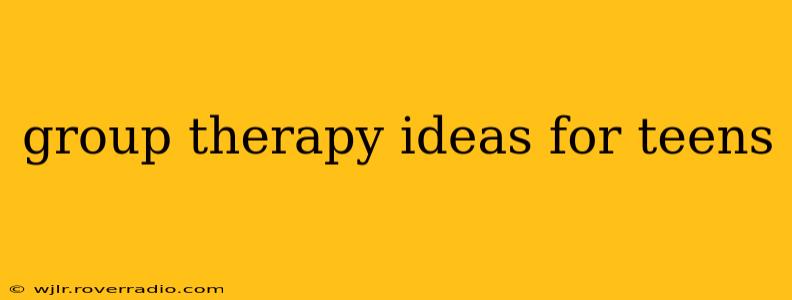Teenage years are a whirlwind of change, challenges, and self-discovery. Group therapy provides a safe and supportive environment for teens to navigate these complexities, connect with peers facing similar struggles, and develop valuable coping mechanisms. This article explores diverse and engaging group therapy ideas tailored to the unique needs and interests of adolescents.
What are some good topics for teen group therapy?
This is a crucial question, as the effectiveness of group therapy hinges on choosing relevant and engaging topics. Topics should resonate with the teens' experiences and provide opportunities for skill-building and self-reflection. Here are a few examples:
-
Managing Anxiety and Stress: This is a prevalent concern among teens. Group sessions can focus on identifying triggers, practicing relaxation techniques (deep breathing, mindfulness), and developing coping strategies for stressful situations like exams or social pressures. Role-playing challenging scenarios can be incredibly beneficial.
-
Improving Communication Skills: Misunderstandings and conflict are common in teenage relationships. Group therapy can provide a platform to practice assertive communication, active listening, and conflict resolution techniques. Discussions on healthy boundaries and expressing emotions constructively are also vital.
-
Navigating Social Media and Technology: The digital world significantly impacts teens' lives. Group sessions can address issues like cyberbullying, social comparison, body image, and healthy online habits. Discussions about responsible technology use and managing online interactions are crucial.
-
Identity Exploration and Self-Esteem: Adolescence is a period of significant identity development. Group therapy can offer a supportive space for teens to explore their values, beliefs, and aspirations, while building self-confidence and positive self-image. Activities like journaling and creative expression can enhance self-awareness.
-
Building Healthy Relationships: Developing healthy relationships with peers, family, and romantic partners is a key aspect of adolescent development. Group sessions can focus on identifying healthy relationship dynamics, setting boundaries, and navigating conflict constructively. Discussions about consent and respect are crucial.
-
Coping with Grief and Loss: Teens may experience significant loss during their formative years, whether through the death of a loved one, a breakup, or other challenging life events. Group therapy provides a supportive community to process grief, share experiences, and develop coping mechanisms.
What are some fun activities for teen group therapy?
While serious discussions are essential, incorporating fun and engaging activities can enhance participation and create a more positive group dynamic. Consider:
-
Creative Expression: Art therapy, music therapy, drama, and journaling can provide alternative avenues for self-expression and emotional processing.
-
Games and Icebreakers: Fun icebreakers and group games can help build rapport and foster a sense of community among group members.
-
Role-Playing: Acting out real-life scenarios can be a powerful tool for practicing communication skills and developing coping mechanisms.
-
Mindfulness and Relaxation Exercises: Guided meditations, breathing exercises, and yoga can help teens manage stress and anxiety.
How do you make group therapy engaging for teens?
Engaging teens in group therapy requires a thoughtful approach that prioritizes their interests and needs. Here are some key strategies:
-
Create a Safe and Supportive Environment: Emphasize confidentiality and respect, ensuring all participants feel comfortable sharing their thoughts and feelings.
-
Incorporate Interactive Activities: Avoid lengthy lectures. Instead, prioritize interactive discussions, activities, and exercises.
-
Tailor Activities to Teens' Interests: Consider incorporating activities related to their hobbies, interests, and passions.
-
Promote Peer Support and Connection: Encourage group members to support each other and build positive relationships.
-
Celebrate Successes and Progress: Acknowledge and celebrate the progress made by individual members and the group as a whole.
What are some common challenges in teen group therapy?
While group therapy offers numerous benefits, some challenges can arise:
-
Resistance to Participation: Some teens may initially be reluctant to participate or share their feelings.
-
Maintaining Confidentiality: Establishing clear guidelines regarding confidentiality is crucial.
-
Managing Conflict: Disagreements and conflicts may arise among group members. The therapist's role is to facilitate constructive conflict resolution.
-
Power Dynamics: Peer pressure and hierarchical dynamics can influence group interactions. The therapist needs to address these dynamics appropriately.
By carefully addressing these challenges and utilizing creative and engaging approaches, group therapy can be a transformative experience for teens, empowering them to navigate their challenges and build a stronger sense of self and belonging. Remember that a skilled and experienced therapist is essential for facilitating a successful and supportive group therapy experience for adolescents.
